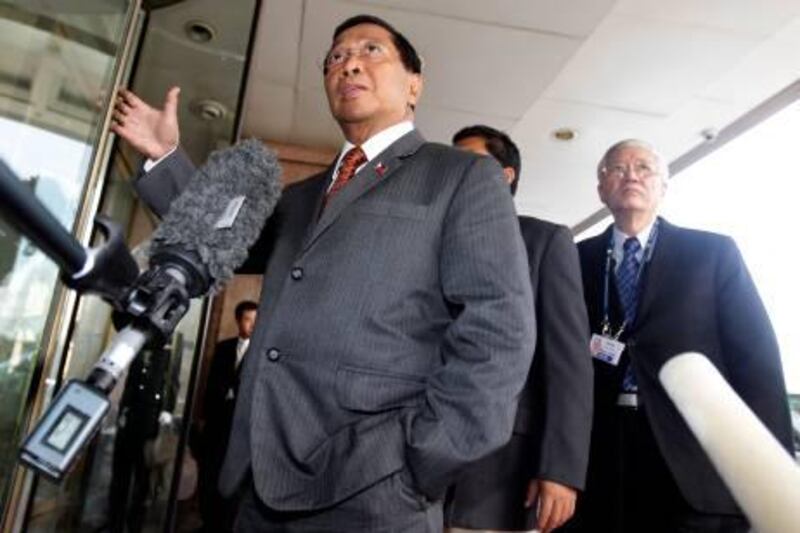ABU DHABI // Greater protection for Filipino migrant workers will be a top priority for the Philippine vice president during his visit to the UAE this week.
Jejomar Binay is due to arrive in the capital on Wednesday evening during his tour of the region, after visits to Kuwait and Saudi Arabia, where similar issues will be raised.
Mr Binay is also monitoring his government's evacuation of Filipino workers from Libya and the safety and wellbeing of his compatriots in Bahrain and Yemen.
"The vice president is looking forward to the two countries working together in promoting the welfare and increasing the level of protection for overseas Filipino workers," said Mr Binay's spokesman, Joey Salgado.
Greater protection "would be in the interest of both the Philippines and the UAE", he said.
Mr Binay, who is also presidential adviser on overseas Filipino workers' (OFWs) concerns, said on Friday: "I intend to pursue whatever arrangements are necessary and possible to improve the general working conditions and status of our global workers in the Middle East, especially those working as domestics, and specifically those involved in cases needing immediate official help."
The embassy has arranged for Mr Binay to meet two UAE officials on Thursday for talks on labour, agriculture, investments, trade and other issues of mutual interest. Mr Binay "is confident that the two countries could further explore new ways of enhancing economic co-operation", Mr Salgado said. "In line with the Emirates' programmes in the area of food security, the vice president hopes that the UAE would consider agricultural investments in the Philippines and in the halal industry."
During his two-day visit, Mr Binay also hopes to raise the possibility of a partnership in renewable energy, in which the Abu Dhabi Fund for Development could finance projects in the southern Philippines.
"The Philippines has one of the world's largest geothermal reserves and the UAE might be interested in investing in this sector," Mr Salgado said.
John Leonard Monterona, the Middle East co-ordinator for Migrante, a migrant rights group, said he expects the vice president to look into the plight of domestic helpers and construction workers who are the "most vulnerable to abuse, maltreatment and labour malpractices".
"We expect changes to happen after his visit," he said. "He will definitely take action on the cases, including the shortage of staff at embassies."
Migrante receives about seven new cases involving vulnerable workers in Arab countries every day, he said. Mr Binay will meet Filipino community groups in Abu Dhabi on Thursday and Dubai on Friday.
"OFWs have contributed to the economic stability of the Philippines," Mr Salgado said. "The vice president is proud that our OFWs have also contributed to the development and progress of the UAE."
There are nearly 610,000 Filipinos in the UAE, according to figures from the Commission on Filipinos Overseas in Manila. The UAE is the second most popular destination for Filipino migrant workers after Saudi Arabia.
Mr Binay will visit the Filipino Workers Resource Centre, a women's shelter with branches in Abu Dhabi and Dubai, which is home to dozens of Filipinas who have fled their employers' homes complaining of mistreatment.
"There is no existing bilateral agreement between the Philippines and countries in the Middle East to protect the rights and welfare of household workers," said Analiza Magno Concepcion, the chairman of Filcom, the umbrella organisation of more than 90 Filipino community groups in Dubai and the Northern Emirates. "They are considered servants and are not covered by the labour law. We'd like to bring this issue to our vice president's attention, among other concerns."
The number of housemaids fleeing their employers was rising, but the reasons remained unclear, said Mrs Concepcion.
"A bilateral agreement is needed to ensure they have better working conditions and their rights are protected," she said.
rruiz@thenational.ae






